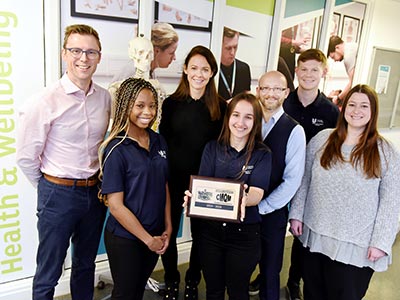Course overview
MSci (Hons) Chiropractic
Discover why you should study chiropractic at Teesside, from our accredited staff to our facilities which replicate practice. Hear from current students as they tell us about their experience and why they chose this subject.
You develop your knowledge, skills and behaviours which will enable you to deliver high levels of patient care in a safe and competent manner.
A mix of theory and practical-based modules develop the required knowledge base and practical skills required to be a chiropractor. You undertake several clinical placements throughout the course, including spending time in chiropractic practices throughout the North East of England. This will include four- ten days in Year 1, ten days in Year 2, and 26 days in Year 3. Year 4 includes a clinical placement in an on-campus outpatients’ clinic. 100% attendance is a course requirement.
Top reasons to study this course include:
> Chiropractic is an internationally recognised growing profession offering global career opportunities.
> State-of-the art chiropractic lab space to support the development of your practical skills
> On successful completion of the course, you will be eligible to apply for registration as a chiropractor with the General Chiropractic Council.
You can apply for our Placement Support Fund if you are experiencing financial difficulties attending your placement. Find out more.
Supporting information for applicants
Our School feedback policy (word - 278kb)
Our School reference policy (word - 276kb)
Course details
Course structure
Year 1 core modules
Clinical Anatomy for Chiropractic Practice
You gain a foundation of functional anatomical knowledge and biomechanical principles, which underpin normal movement and the neuromusculoskeletal components of clinical chiropractic practice.
Structural anatomy of the musculoskeletal system will be introduced and related to common movement tasks and movement patterns. Clinical biomechanical principles including tissue biomechanics of ligaments tendon and fascia; arthrokinematics (joint motion) and muscle function will be presented and their impact on normal movement and function explored.
Interactive practical workshops rooted in problem-solving will introduce key themes and develop relevant practical skills. Specific theoretical underpinning will be developed through small group work; peer formative assessment tasks and self-directed study. Theoretical content will be complemented by guided by self-study resource material and use of e-learning resources e.g. Anatomy TV.
Peer and tutor feedback will be given on practical skills application during the taught sessions. Self-directed quizzes, tutor-marked short answer questions and practical skills station tasks will be utilised to help you consolidate your theoretical knowledge.
Clinical Imaging for Chiropractic Practice
You are introduced to the scientific theory underpinning the practice of radiography, including radiation physics, radiation protection and the theoretical aspects of producing and reviewing radiographic images of normal anatomy and the joints and spine. You explore the theoretical aspects of imaging strategies with consideration of ionising and non-ionising radiation modalities, equipment and the physical and radiation safety of all individuals in the environment, introducing the risk-benefit philosophy and principles involved in the practice of radiography.
Clinical Neuroanatomy for Chiropractic Practice
You gain a foundation of clinical neuroanatomy knowledge which underpins normal movement and the neuromusculoskeletal components of clinical chiropractic practice. Structural anatomy of the central peripheral and autonomic nervous systems will be introduced and related to normal neuromusculoskeletal function. Interactive practical workshops will be used to introduce key themes and to develop relevant practical skills. Specific theoretical underpinning will be developed through clinical problem-solving, small group work, peer formative processes and self-directed study. Theoretical content will be complemented by guided self-study resource material and use of e-learning resources.
Clinical Physiology for Chiropractic Practice
The basic processes, principles and concepts of human physiology and pathophysiology, organisation of the body and body systems relevant to clinical practice introduced and the principles underpinning maintenance of homeostasis explored. Infection, inflammation and repair processes will also be introduced with reference to clinical therapy practice. Learning activities and small group working will be utilised to encourage, promote and develop independent study skills and collaborative, active learning.
Foundations Skills for Chiropractic Practice 1
You are introduced to core clinical and professional skills which include; effective communication, working with and understanding the role of the chiropractor and other healthcare professionals. You explore professionalism, statutory requirements for practice and transition to higher education. Key information, theoretical concepts and practical skills will be introduced and developed through pre-recorded lecture materials supported by interactive practical workshops. Small group work and directed supplementary reading will be utilised and formative feedback on practical skills will be given. You undertake five practice placement days to enable you observe interaction with patients and healthcare professionals. To prepare to go out in placement you complete mandatory sessions (such as health and safety issues, risk assessment, safeguarding, conflict resolution and information governance).
Foundations Skills for Chiropractic Practice 2
This module builds upon knowledge and skills identified within the Foundation Skills for Chiropractic Practice 1 module and enables you to develop an understanding of your profession-specific role within health care. You further develop knowledge and skills and to the core clinical skills for clinical assessment and principles of basic chiropractic therapeutic interventions.
Clinical case scenarios will be used to contextualise your practical learning and facilitate the integration of theory with practice. Small group work will be utilised and formative feedback on practical skills will be given throughout the module by tutors and peer feedback will be encouraged. You consolidate and reflect upon your learning through a reflective journal. Five practice placement days enable you to gain further observational experience of the assessment and treatment that is offered to patients in healthcare practice.
Year 2 core modules
Chiropractic Management of the Lower Quadrant across the Lifespan
You develop knowledge understanding and skills in chiropractic manipulative and manual therapy approaches to the assessment and treatment of neuromusculoskeletal dysfunctions and disorders of the lower quadrant; including the lumbar spine, hip, sacro-iliac joint, foot and ankle.
You work systematically through common pathologies and management of the lumbar spine and the peripheral joints of the lower limbs. Emphasis will be placed on developing practical manual therapy assessment and treatment handling skills alongside and promoting clinical reasoning skills to enhance problem-solving skills and appraisal of evidence underpinning practice. The concepts of altered neurodynamics and muscle imbalance impacting on lower quadrant on will also be explored.
Five practice placement days enable you to gain further observational and some hands on experience of the assessment and treatment that is offered to patients in chiropractic practice.
Chiropractic Management of the Upper Quadrant across the Lifespan
You develop knowledge understanding and skills in chiropractic manipulative and manual therapy approaches to the assessment and treatment of neuromusculoskeletal dysfunctions and disorders of the upper quadrant; including the cervical and thoracic spine, shoulder complex, elbow, wrist and hand.
The module is structured to work systematically through common pathologies and management of the cervical and thoracic spine and the peripheral joints of the upper limbs. Emphasis will be placed on developing practical manual therapy assessment and treatment handling skills alongside and promoting clinical reasoning skills to enhance problem-solving skills and appraisal of evidence underpinning practice. The concepts of altered neurodynamics and muscle imbalance impacting on upper quadrant on will also be explored.
Five practice placement days enable you to gain further observational and some hands on experience of the assessment and treatment that is offered to patients in chiropractic practice.
Clinical Neurology for Chiropractic Practice
You build on the knowledge developed in the Neuroanatomy for Chiropractic Practice module, and examine neurological impairment and dysfunction. You will contribute to subjective and objective chiropractic neurological assessment and subsequent management.
Weekly interactive seminars will develop critical knowledge of clinical skills in relation to the therapeutic management of neurological conditions. Formative feedback from peers and tutors will run throughout the module providing an opportunity for you to reflect and receive constructive feedback.
Evidence-based Concepts for Contemporary Chiropractic Practice
This module will introduce the differing research approaches and methodologies underpinning the evidence supporting practice and practice development. You gain an overview of qualitative and quantitative research methods and facilitate the development of skills in interpretation of data and basic critical analysis of individual research studies. You explore how evaluation and integration of relevant scientific and clinical evidence enhances application of evidence-based practice to treatment and management rationales in chiropractic practice.
Health Wellbeing and Lifestyle Issues in Chiropractic Practice
You develop knowledge and understanding of health, wellbeing, and lifestyle issues for patient-centred chiropractic practice. You also develop knowledge and understanding of biopsychosocial and behavioural science theories which underpin and contribute to the health and wellbeing of the individual. You explore shared decision-making, client education and lifestyle changes to health and health initiatives across the lifespan continuum.
The module considers the role of chiropractic practice within multidisciplinary approaches to health and wellbeing initiatives and lifestyle choices. You develop an understanding of the individual person and their lived experience to enable their unique needs, preferences and values to be respected and autonomy and independence to be facilitated. Service users, carers and practitioners will contribute where appropriate to add the lived experience to the theoretical underpinning.
You will be challenged to look beyond a medicalised approach to health and to explore the multifactorial issues impacting on health including psychosocial, sociocultural and environmental factors.
Pathology for Chiropractic Practice
You develop knowledge of pathology and explore clinical reasoning required for diagnostics and therapeutics. The module explores pathology principles to support clinical assessment and differential diagnostic analysis and will focus on disease processes at cellular, tissue, organ and multi-system levels, this will enhance chiropractors understanding of disease processes. It also explores pathology and key mechanisms of disease offering the scientific knowledge a chiropractor needs to refine diagnosis and to make treatment decisions.
Year 3 core modules
Chiropractic Case Management in Special Populations
You enhance clinical skills and expand on clinical reasoning skills and abilities in specialist populations with specific focus on paediatric management and chiropractic in sport injury management. You build on the assessment, diagnostic, treatment and rehabilitation skills developed through the earlier modules to develop and justify your management approaches. Specific clinical conditions will be discussed and patient management strategies considered. Current evidence underpinning the principles of condition-specific therapeutic treatment approaches and protocols will be explored. You evaluate the challenges of implementing an evidence-based approach to chiropractic practice.
Complex Case Management in Chiropractic Practice
You enhance clinical skills and expand on clinical reasoning skills and abilities, and build on the assessment, diagnostic, treatment and rehabilitation skills developed through the earlier modules to develop management approaches to clients with problems of increasing complexity. Complex clinical conditions will be discussed and patient management strategies considered. Current evidence underpinning the principles of condition specific therapeutic treatment approaches and protocols will be explored. You evaluate the challenges of implementing an evidence-based approach to chiropractic practice. The module will draw on your ability to retrieve and synthesise material previously learned in the course and integrate it with new information, knowledge and skills.
Current Approaches to Pain Management
The contemporary understanding of pain science and current approaches to pain assessment and management are introduced in this module. You cover principles of pain assessment and management in chiropractic practice from a holistic perspective by exploring the meaning and consequences of pain to the individual (the psychological, social, physical and spiritual dimensions of pain) and its impact on patients and their families.
Designing Research Projects in Chiropractic Practice
You gain the necessary knowledge and skills to design and manage a primary or secondary research that is relevant to chiropractic practice. You develop skills in project design and management; primary and secondary research methods. You also cover research governance and ethics to prepare you for applying for ethical approval/release.
Functional Movement and Exercise in Chiropractic Practice
You build on the clinical management approaches available to chiropractors in the holistic management of movement and movement dysfunction. You explore the current approaches in the design and prescription of functional movement activities and exercise for the maintenance and improvement of function and health. The physiological effects of exercise on the main body will be considered in relation to exercise prescription in the management of musculoskeletal dysfunction as a result of disease, trauma and overuse disuse.
Final-year core modules
Leading and Managing in Chiropractic Practice
This module will assist you to lead and manage within post-qualifying contemporary health care practice. You consider the current challenges and drivers within contemporary chiropractic practice, issues associated with leadership, business and practice management and explore the behaviours and skills that enable effective service delivery and inter-professional working.
The module will use a masterclass approach related to business and practice management skills. Through online and directed learning you explore the contemporary drivers and challenges facing the chiropractic profession. You analyse leadership and quality improvement skills and behaviours that enable high quality, continually improving practice, thus enhancing the reputation of the profession.
Major Project for Chiropractic Studies
This module runs over two semesters and is your opportunity to carry out a piece of research and complete a research paper. You are also required to defend your area of research through an oral defence of a poster. You demonstrate advanced capabilities in retrieving, critically appraising and developing knowledge and understanding in a topic related to your area of practice. You develop skills in the consideration of ethical issues pertaining to your research and facilitate demonstration of advanced skills in presentation of research.
This is a 40-credit module.
Professional Chiropractic Practice
You consolidate and develop your clinical reasoning and practical skills in the skills laboratory and in a practice environment. The module offers and new educational challenges as you encounter patients across the lifespan, with a range of health care problems within the University's in-house Chiropractic Clinic. Masterclasses led by external experts in the field will be used to add richness to the your final year experience. You will be partners in the design of the module content and will be asked to decide on the topic areas covered in the masterclasses.
Modules offered may vary.
Our Disability Services team provide an inclusive and empowering learning environment and have specialist staff to support disabled students access any additional tailored resources needed. If you have a specific learning difficulty, mental health condition, autism, sensory impairment, chronic health condition or any other disability please contact a Disability Services as early as possible.
Find out more about our disability services
Find out more about financial support
Find out more about our course related costs
Entry requirements
Entry requirements
Call us on 01642 738400 about our entry requirements
For general information please see our overview of entry requirements
International applicants can find out what qualifications they need by visiting Your Country
You can gain considerable knowledge from work, volunteering and life. Under recognition of prior learning (RPL) you may be awarded credit for this which can be credited towards the course you want to study.
Find out more about RPL
Employability
Career opportunities
This course is designed to prepare you to become a registered chiropractor with the General Chiropractic Council.
Career opportunities within the profession are varied and could include you working in a clinic as an associate chiropractor or even starting your own practice. Careers in research and academia also could be of interest.
Work placement
As well as university based teaching and learning, placements will be used to further expand your knowledge base allowing you to see how the theory is applied directly in practice. This will also serve to strengthen your skills base over the duration of the course.
Placements are an integral part of the course. You will take part in a variety of placements from Year 1. This requires travel to and from different locations within the North East.
Information for international applicants
Qualifications
International applicants - find out what qualifications you need by selecting your country below.
Select your country:
International applicants
Please refer to Entry Requirements page for more detailed information
Useful information
Visit our international pages for useful information for non-UK students and applicants.


 MSci (Hons) Chiropractic
MSci (Hons) Chiropractic MSci Chiropractic
MSci Chiropractic
